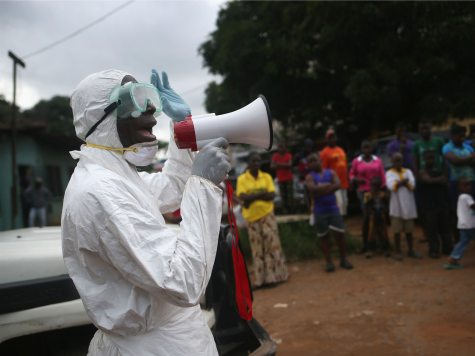The news that health workers fighting against the Ebola outbreak in Liberia are threatening to strike over long hours and unsanitary conditions should come as no surprise, given the high toll the healthcare community has had to pay for this virus. In Ebola-infected countries, from Sierra Leone to Spain, fear and unpreparedness have triggered a backlash among the medical community.
The Associated Press reports that Liberian health workers are demanding extra hazard pay just as the already deteriorated situation in the country worsens, arguing that the government is not doing enough to repay workers who risk their lives fighting to keep Ebola victims alive. Health workers covered by the National Health Workers Association are demanding $700 a month in hazard pay, which they claim the government agreed to but never paid. Currently, most make less than $500 a month in hazard pay. The government has refused to budge. It has, instead, attempted to expedite medical training for students to replace health workers if they begin to strike, according to members of the association.
The calls to protest and strike triggered the nation’s largest such protest at, predictably, the largest Ebola treatment facility in the country: Island Clinic, run by the World Health Organization. According to the nation’s Observer publication, health workers at Island Clinic staged “an angry protest over the weekend when health workers and support staff staged a demonstration to demand their benefits and salary arrears.” The protest was large enough for President Ellen Johnson Sirleaf to send a representative to quell the uproar, though the Observer notes that intervention by the opposition party finally served to calm the public.
The strike, for now, has been averted, with healthcare workers imposing, rather, a “go-slow” action–a partial strike in which workers leave for half the day, though many do not return at all. Speaking to Front Page Africa, multiple healthcare workers noted not only that they were not receiving the promised increase in pay from the government, but that they had not received any money at all, nor were they covered by health insurance, despite working in the vicinity of Ebola patients every day.
Unlike healthcare workers in Spain and the United States–nations where the virus has spread from patient to medical professional–workers in Liberia must worry about failings in their protective gear, as well as deliberate attacks on behalf of Ebola patients who refuse to believe medical workers do not carry the virus themselves. Scratchings are common in some Ebola wards, where workers risk “being attacked by a belligerent Ebola patient that sinks their nail into the suit and scratch you, thereby [making] direct contact, which is the way one can get infected with the deadly virus.” One worker, Eric Jacobs, told Front Page Africa that a friend of his who worked as a hygienist recently died: “One of the patients scratched him, tore his [protective equipment] and that’s how he got infected. What will become of us?”
In addition to ill treatment from the government, Liberian medical personnel who have come into contact with Ebola are routinely mistreated by their communities–evicted by landlords horrified of the virus and shunned by family members who want to survive. Others believe it is the health workers who are killing Liberians, not the Ebola virus itself.
That the Liberian government has managed to staff Ebola facilities with health workers at all is no small feat. Health workers, noting the dangers of coming into contact with Ebola patients, began fleeing medical facilities in July, when only 12 cases of medical staff dying of Ebola had been recorded in Liberia. An estimate of at least 233 healthcare workers have died of Ebola worldwide since the current outbreak began.
The panic gripping the medical community of Liberia is not unique to that country. In Sierra Leone, burial teams most-prominently went on strike, alleging that they were not getting paid at all to handle toxic Ebola remains. Health workers in the nation also went on strike this month, leaving remains to decompose on the streets of Freetown; that strike has since, for now, been resolved.
Even outside the continent of Africa, health workers facing the threat of Ebola have exhibited increasing concern over whether their governments have their best interests in mind. In Spain, the first country to diagnose a native Ebola contamination outside of Africa, health workers are protesting the government, alleging they are insufficiently protected. Medical workers at Carlos III Hospital in Madrid, where Teresa Romero, the nation’s first Ebola patient, is being treated, threw their used gloves at Prime Minister Mariano Rajoy in protest and yelled, “Out!” as the head of state approached the facility. More than 200 workers organized a separate protest calling for Minister of Health Ana Mato to resign.
In the only other country outside of Africa in which someone has contracted Ebola from a contaminated patient, the United States, airport workers feel insecure after Liberian Thomas Eric Duncan arrived in Texas from Monrovia and tested positive for the disease. Workers at LaGuardia Airport in New York City staged a protest to demand safer working conditions, as many experts have come to the consensus that current screening for Ebola at airports does little to prevent an outbreak. In another incident, a doctor in Atlanta arrived to that city’s Hartsfield-Jackson International Airport wearing a full HAZMAT suit, protesting the insufficient protections provided medical personnel.
As the outbreak continues to spread in affected areas–and threatens to surface elsewhere around the world–healthcare workers on the front lines will require of every nation their utmost protection. Half the hundreds of medical personnel involved in the fight have died, according to figures almost unanimously considered conservative estimates, and many more continue to remain dangerously close to the active virus.

COMMENTS
Please let us know if you're having issues with commenting.